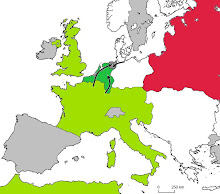 In the south of Germany the presence of allied soldiers on the soil of the Third Reich caused consternation amongst the Nazi high command. Rommel had however identified the port of Trieste as key to the allied supply lines and was allowed to marshall a large German force to attack this important objective. The allies had difficulties maintaining air support in this region and faced problems supplying their armies across the Alps. They knew Trieste was vital and the American army was deployed in force when the German attack came.
In the south of Germany the presence of allied soldiers on the soil of the Third Reich caused consternation amongst the Nazi high command. Rommel had however identified the port of Trieste as key to the allied supply lines and was allowed to marshall a large German force to attack this important objective. The allies had difficulties maintaining air support in this region and faced problems supplying their armies across the Alps. They knew Trieste was vital and the American army was deployed in force when the German attack came.At the same time that Rommel’s massed tank formations, some taken from the garrisons of Greece and Yugoslavia, began their attack towards Graz, six German divisions in Bavaria launched an assault on the British army holding Munich. Here the Germans fared badly, though losses were high on both sides. After two weeks of hard fighting the attack petered out before reaching the German city, a great disappointment for the German high command.
Further east Rommel’s armoured push was much more successful. The allies, with the US Airborne divisions in the front line, fought valiantly, but were unable to halt the massed panzer forces arrayed against them. While tenaciously conducting the defence of Graz, a second force barrelled into the American flanks further south. Trieste was surrounded then evacuated on the 21st, and on the 28th Graz fell to the Germans. By the end of the month the German attack had been halted at Udine, but the allies could see that their foothold in Germany now lay in immediate peril.
While the Germans were counter attacking in Austria and Italy, the French still waited for their liberation, disappointed at the allied strategy to go straight for the heart of the Axis. Fed up with De Gaulle's complaints, the Imperial General Staff ordered an attack towards Marseilles. Shortly into the operation, a German force was encountered, apparently testing the British defences.
Lead by assault guns and a single King Tiger, the Germans made early progress towards the British lines. However, the arrival of British reserves forced them back, and when a recon patrol found a way into the German rear (destroying a battery of Panzerwerfers in the process), the Germans were forced to retreat.
3 days after the start of the operation saw both forces back in their original positions, with even casualties. The British had failed to break into France from the south and the Free French leader protested in vain that the liberation of his country be given top priority, dismissing the attempted British attack as a “sideshow”.

No comments:
Post a Comment